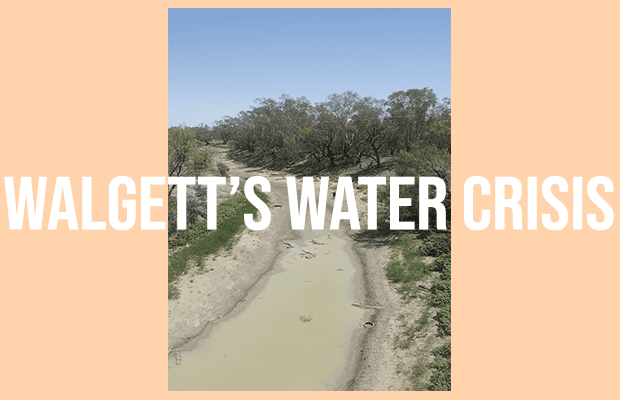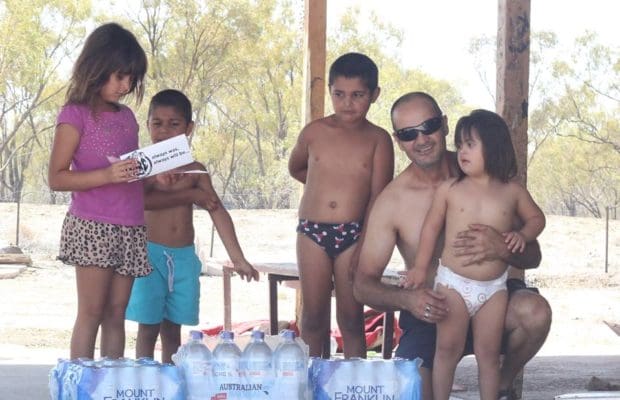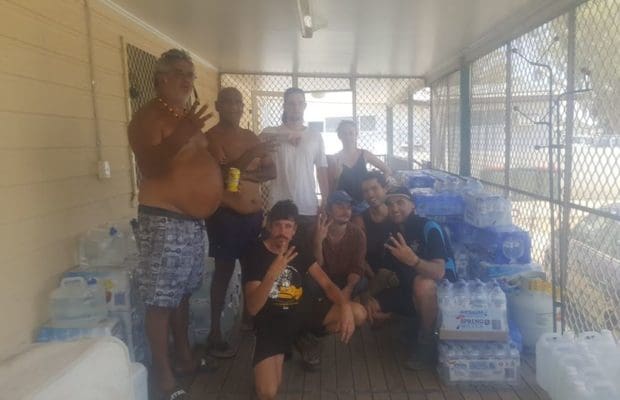A water crisis is unfolding in the small north-west NSW town of Walgett, with residents currently drinking bore water that has been deemed unsafe by public health experts.
The situation comes amid record-breaking temperatures across NSW, with the mercury frequently climbing past 45 degrees since the new year. Walgett’s water woes also mirror issues across the north-west and far west of the state, where many communities are experiencing issues with water access due to the depletion of the Murray-Darling river system.
Usually, towns like Walgett, Menindee, Broken Hill and Wilcannia use water from the rivers to supply their needs. However, with the rivers dry these places have been forced to rely entirely on bore water for drinking and bathing, with many residents complaining about their water’s foul taste and appearance as well as negative health impacts.
Associate Professor Jaqcui Webster, director of a World Health Organisation unit on the health impacts of salt, released a statement through the local Dharriwaa Elders Group on the 30th of November warning that long-term exposure to bore water in Walgett could negatively impact on residents’ health. Walgett’s water contains approximately twice the safe level of sodium, which would expose residents to high blood pressure and therefore induce higher rates of stroke, heart problems and kidney disease. Salt exposure is already above healthy levels in the community due to high consumption of salty preserved foods, which are cheaper and more accessible in remote areas than fresh foods.
“Walgett” is a Gamilaraay (also spelt Gomeroi, Gamilaroi or Kamilaroi) word meaning ‘two rivers’, referring to the town’s location near the Barwon and Namoi rivers which join at Walgett before flowing into the Darling river system. The rivers are culturally vital for Gamilaraay people, among other reasons because they continue to provide a source of healthy traditional foods such as freshwater mussels and fish. They are also socially and economically vital to the town, providing water for livestock and crops as well as drinking water and recreation in the summer. However, both rivers are almost entirely dry due to decreased overall flows resulting from the drought, and because of water extraction by upstream irrigators. While the rivers have run dry before, these events are becoming more common and severe, a situation which scientists have linked to both climate change and the failure of water management overall in the Murray-Darling Basin.
In early January, Walgett’s water treatment facility failed due to a power outage, leaving the town entirely without a water supply for several days. Volunteers delivered bottled water from nearby towns, with some deliveries funded by community donations and others donated by local businesses. The plant was repaired and water supply from the bore was restored, but concerns remain over the health impacts of this water source.
Walgett has a population of approximately 2500 people, of whom at least 45% are Aboriginal. The town is regarded as one of the most socially disadvantaged in NSW. Aboriginal residents of Walgett are on average 20% more likely to be unemployed, earn 25% less, and are over 20% less likely to have completed high school or attained a tertiary qualification than their non-Aboriginal counterparts. Aboriginal people across Western NSW live approximately 20 years shorter than non-Aboriginal people, chiefly due to health issues arising from poor diets. These social indicators have not improved in the previous decade, and in some instances are getting worse.
Alongside the town itself, two nearby Aboriginal communities at Gingie and Namoi Village are home to a further 100 families. Gingie is a former mission, while Namoi Village was a government-run Aboriginal reserve. Until the 1967 Referendum, Aboriginal people in these communities were legally wards of the state, and could not marry, seek employment or leave their communities without the permission of local authorities and the NSW Aborigines Protection Board.
Walgett is a good example of what sociologist Barry Morris calls the ‘cultural borderlands’ of north-west and far-west NSW, where the process of colonialism remains more obviously unfinished and questions of Aboriginal disadvantage remain more clearly unresolved than in the more heavily developed parts of the state.
Towns in the region have large Aboriginal communities who have become increasingly culturally and politically assertive since the emergence of the Aboriginal land rights movement nationally since the 1970s. This has taken the form of cultural initiatives such as Gamilaraay language revival, the formation of Aboriginal community services, and political advocacy around Aboriginal land ownership.
Aboriginal demands for the restoration of land in particular, fundamentally challenge the social, political and economic rural status quo, which is historically based on the dispossession of Aboriginal nations by white farmers for pastoral and agricultural development. Aboriginal people never alienated their land through a sale and were not officially conquered by the British crown, implying an ongoing need for either restoration of land or financial compensation. This radically threatens the economic interests of rural landowners, who have responded by politically challenging the legitimacy of Aboriginal land claims and dismissing calls for Aboriginal self-determination. Subsequently, a re-assertion of the colonial relationship in towns like Walgett has been seen, a trend especially visible in the rising numbers of local police, cuts to community-run services, and worsening rates of child removal and incarceration for Aboriginal people. In 2015 Walgett saw the construction of a new $16 million police station, while the previous year a domestic violence service for Aboriginal women was closed due to budget cuts.
Social problems in remote NSW are also directly linked with the health of the rivers and the broader environment – in particular, droughts lead to poor mental health especially among young people, and higher rates of youth crime are linked to heatwaves and periods when local rivers are dry. Rivers are an important source of affordable recreation, offering the opportunity for young Aboriginal people to cool off and socialise away from the often oppressive atmosphere of towns where racism has always been part of the social fabric.
Authorities have been slow to respond to the crisis in Walgett, with local Mayor Ian Woodcock initially claiming the water is safe to drink and telling residents it is “better than nothing”. However, NSW regional water minister Niall Blair has now called for an investigation into water quality in the town, and the state government has offered funding for initiatives to fix the water supply problems. Enlarging the town weir, constructing long pipelines to pump water from healthier rivers, or building a local desalination plant have been suggested as ways to ensure a reliable supply of safe drinking water for the town.
However, these suggestions do not address the fundamental issue raised by locals; the over-allocation of water to irrigation farmers. The combination of the drought and large volumes of water being diverted into private dams for irrigation has left the Barwon and Namoi rivers largely dry, with ‘environmental flows’ released from upstream dams unable to reach Walgett or the towns along the Darling river further downstream.
Locals across rural NSW argue that management of the Murray-Darling river is corrupt, with regulators unable or unwilling to police irrigators who extract too much water, and widespread collusion between state and federal governments and irrigators in the process of deciding limits on water use. The coal industry, which has expanded in recent years into the Namoi river valley with the construction of large open-cut mines near Boggabri, Gunnedah and Narrabri, uses very large quantities of water but is not required to publicly report how much water is used. This has led to a demand for a Royal Commission into the management of the river system, and limits on the volume of water that can be pumped out of rivers for use irrigating crops, along with calls for limits on the further expansion of coal mining in the area.
Aboriginal organisations and advocacy groups have also argued for a greater role in water management. Northern Basin Aboriginal Nations (NBAN), a coalition of native title holders in the upper part of the Murray-Darling river system, has criticised its exclusion by NSW authorities from decision making around the water crisis. NBAN’s leaders have also backed calls for a royal commission into the Murray-Darling management plan, which they argue has clearly failed to provide any benefits to the health of the river or to the predominantly Aboriginal communities along it.
With the long-term viability of towns like Walgett dependent on resolving the water crisis, their future looks uncertain. Locals have welcomed the donations of drinking water from other towns, but stress that this is not a long term solution. What is ultimately needed is an investment in sustainable and safe water supply and a greater role for Aboriginal communities in water and other aspects of environmental management.
Volunteers from Sydney-based Aboriginal rights group FIRE, including students from Sydney University, have been collecting donations of money and water and organising deliveries of safe drinking water to Walgett. If you would like to donate, send funds to:
Bendigo Bank
SAWC Sydney
BSB 633 000
Acct 150 758 621
(there are no spaces, just there for ease of reading)
Please write * Walgett * in the description tab so we know what monies are for.
Or contact the FIRE page to arrange donations of bottled water.







